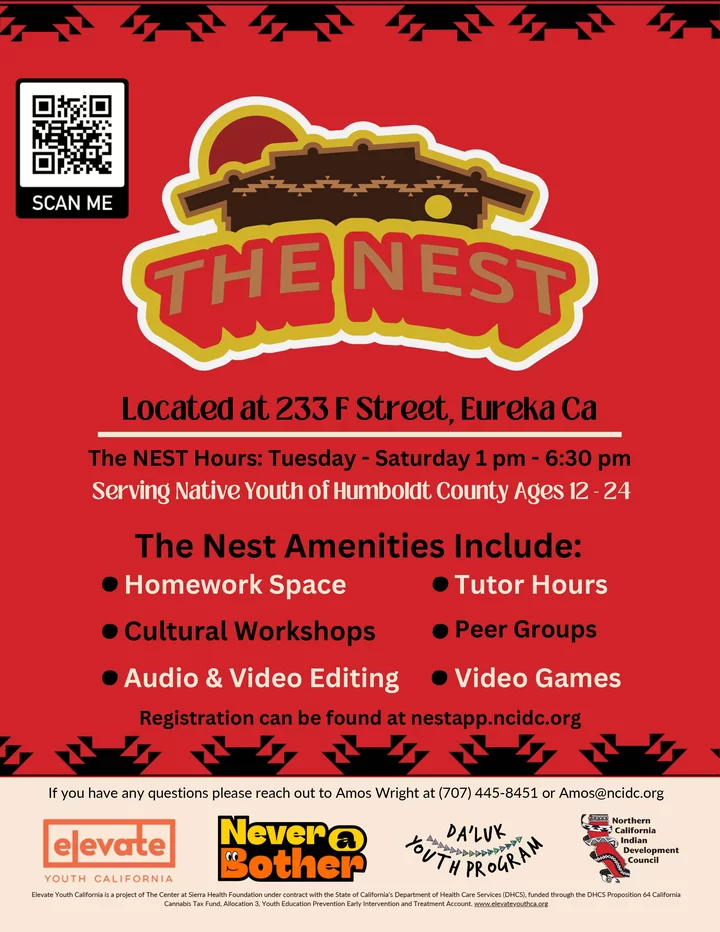“The Nest” flyer. Courtesy of the NCIDC.
F Street starts (or ends, depending on where you’re looking) at the marina in Old Town Eureka. There’s a door, a little bit before the pavement meets the water, in the side of the Carson Block Building; innocuous, easy to walk by. The room it leads into is pale but cozy. Large windows show off a nice view of the street from the vantage point of a few beanbags posted in front of a TV decked out with games. Computers line the wall on the other side, complete with video editing software. Using any of the amenities is free — if you’re aged somewhere between 12 and 24.
Run by the Northern California Indian Development Council, the room is the flagship pull behind “The Nest,” a program focused mainly on Native youth, though anyone is welcome to come. It opened February 1, and is open from 1-6:30 p.m. Tuesday through Saturday.
Besides the TV and the computers, the NCIDC also offers tutors and homework groups at the Nest, and plans to incorporate cultural workshops and some college preparatory resources in the future.
NCIDC youth services director Bubba Riggins said the goal was to give Native kids a safe place to call their own in the middle of Eureka, a city pretty far from the cultural centers in Hoopa or Table Bluff. That distance can take a toll on some.
“A lot of Native folks that live in more urban communities tend to have a harder time,” Riggins said. “We’re hoping for a space to call home. That’s kind of the theory with [the name] ‘The Nest’; it’s a home space.”
Madison Flynn, the CEO of the NCIDC, said she wished she could have had something like The Nest when she was growing up.
“My grandma lived out on Table Bluff,” Flynn said, “Which is only 12 miles from here — but that 12 miles can be a hundred miles [without transportation]. If there were any type of community events out there, we couldn’t go out there. Having that cultural connection is important. We’ll provide that cultural connection here in Eureka…It’s huge for Native youth. They may not be able to get to Hoopa, to Klamath, to Table Bluff.”
Flynn and Riggins made a point of emphasizing that all of the services they’re offering at The Nest are free, which would have been a boon to Flynn when she was growing up and sometimes couldn’t scrape together a dime to buy an ice cream cone at the Boys’ and Girls’ Club.
“I think my teenage years wouldn’t have been as chaotic — more than they already were — if there was a place I could just go and hang out instead of ‘finding activities,’ as most teens do, of their own devices,” Flynn said. “When you grow up in a small town, there’s not a lot of safe activities for you to engage in. [People said] ‘Oh, go to the movies, go do this,’ but that costs money, and a lot of times there’s just a lack of resources.”
“There’s only so much of those things too,” Riggins agreed.
Besides the recreational aspects, much of what they want The Nest to be is educational. Riggins and Flynn hope that they’ll be able to connect kids with college advisors from CR or knowledgeable tradespeople. They know it might be a struggle to get people to come, but Riggins said anyone willing to make the journey would be rewarded.
“Just come down and check it out,” Riggins said. “You don’t have to stay for long…It’s a warm and welcoming place. There’s no commitment. We’re not going to force anyone to be here! Give it a try! Take a healthy risk.”

CLICK TO MANAGE